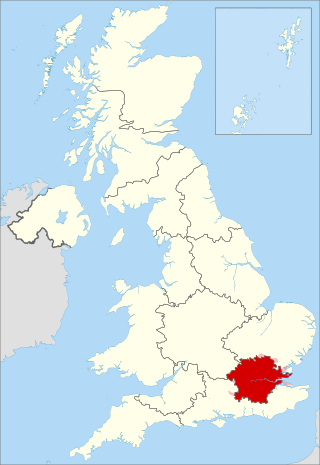Related Research Articles

Associated Television was the original name of the British broadcaster ATV, part of the Independent Television (ITV) network. It provided a service to London at weekends from 1955 to 1968, to the Midlands on weekdays from 1956 to 1968, and to the Midlands all week from 1968 to 1982. It was one of the "Big Four" until 1968, and the "Big Five" after 1968, that between them produced the majority of ITV networked programmes. In 1982, ATV was restructured and rebranded as Central Independent Television, under which name it continued to provide the service for the Midlands.

ITV Central, previously known as Central Independent Television, Carlton Central, ITV1 for Central England and commonly referred to as simply Central, is the Independent Television franchisee for the Midlands. It was created following the restructuring of ATV and began broadcasting on 1 January 1982. The service is owned and operated by ITV plc under the licensee of ITV Broadcasting Limited. Historically Central made a major contribution to the ITV network schedule – especially in entertainment and drama – but today its main responsibility is the regional news service.

London Weekend Television (LWT) was the ITV network franchise holder for Greater London and the Home Counties at weekends, broadcasting from Fridays at 5.15 pm to Monday mornings at 6:00. From 1968 until 1992, when LWT's weekday counterpart was Thames Television, there was an on-screen handover to LWT on Friday nights. From 1993 to 2002, when LWT's weekday counterpart was Carlton Television, the transfer usually occurred invisibly during a commercial break, for Carlton and LWT shared studio and transmission facilities.
Anne Margaret Diamond is a British journalist, broadcaster, and children's health campaigner. She presently hosts the weekend breakfast show on GB News with Stephen Dixon as her co-presenter. She hosted Good Morning Britain for TV-am and Good Morning with Anne and Nick for BBC One, with Nick Owen. In 2023, she was made an OBE for her service to children's health and is the first non-medic to hold the Royal College of Paediatrics College Medal.

Jasmine Lydia Bligh was an English broadcaster and television announcer for the BBC. In the late 1930s, she was one of the first three BBC Television Service presenters, and she, along with Leslie Mitchell and Elizabeth Cowell, delivered continuity announcements introducing programmes in-vision. When the BBC's regular television service debuted in November 1936, Bligh was its first female announcer.

Redvers Buller Kyle was a South African-born British broadcaster, voice over artist, actor and composer, best known for his work on the ITV network in the United Kingdom over forty years.

CITV is a British children's morning programming block on ITV2 and formerly a free-to-air channel owned by ITV plc. CITV, then Children's ITV, launched on 3 January 1983 as a late afternoon programming block on the ITV network for children aged 6–12. It replaced the earlier Watch It! branding and introduced networked in-vision continuity links between programmes. These links were originally pre-recorded from a small London studio up until 1987, when Central won the contract to produce live links from their Birmingham studios. In 2004, presentation of CITV was relocated to Granada Television in Manchester, which saw the demise of in-vision continuity. Nine years later, the operations moved to ITV Granada's MediaCityUK studios in Salford.

Hugo Henry Rignold was an English conductor and violinist, who is best remembered as musical director of the Royal Ballet (1957–1960) and conductor of the City of Birmingham Symphony Orchestra (1960–1968).
Leslie Scott Falconer Mitchell was a British actor and broadcaster who was heard on newsreel soundtracks, radio, and television. Raised by his literary uncle William J. Locke and schooled at The King's School, Canterbury, and Chillon College in Switzerland, he began his career as a stage actor in London's West End after a time as a trainee stockbroker. Mitchell was the first voice heard on BBC Television on November 2, 1936, and also gave the inaugural announcement on Associated-Rediffusion, the joint first company to broadcast as part of the ITV network, on 22 September 1955. His voice was perhaps best known from his lengthy relationship with British Movietone News, for which he provided commentary on newsreels throughout the Second World War and into the mid-1970s. Mitchell was appointed a Freeman of the City of London and the Royal Television Society's first honorary member.
Sylvia Lucia Petronzio, better known as Sylvia Peters, was an English actress, and from 1947 to 1958 a continuity announcer and presenter for BBC Television. She introduced the Coronation of Queen Elizabeth II in 1953, and later advised the Queen as she prepared for her first televised Christmas Message in 1957.

Keith Fordyce Marriott was an English disc jockey and presenter on British radio and television. He was both the first presenter of the ITV television pop music programme Thank Your Lucky Stars in 1961 and of the youth-orientated magazine show Ready Steady Go! on Associated-Rediffusion from 1963 to 1965. Fordyce was a stalwart of both BBC Radio and Radio Luxembourg for many years, being co-host of the BBC Light Programme's Sunday morning show Easy Beat until 1967 and was the first presenter of BBC Radio 2's Sounds of the 60s series from 1983 to 1986.
Peter Tomlinson is a broadcaster and continuity announcer. He created the British children's television series Tiswas and was the programme's co-presenter in its early years.
In the United Kingdom, continuity announcers are people who are employed to introduce programmes on radio and television networks, to promote forthcoming programmes on the station, to cross-promote programmes on the broadcaster's other stations where applicable and, sometimes, to provide information relating to the programme just broadcast.
In broadcasting, continuity or presentation is announcements, messages and graphics played by the broadcaster between specific programmes. It typically includes programme schedules, announcement of the programme immediately following and trailers or descriptions of forthcoming programmes. Continuity can be spoken by an announcer or displayed in text over graphics. On television continuity generally coincides with a display of the broadcaster's logo or ident. Advertisements are generally not considered part of continuity because they are advertising another company.

Dennys Jack Valentine McDonald-Hobley was a British actor, broadcaster and compère, who was one of the earliest BBC Television continuity announcers, appearing on screen from 1946 to 1956. Born in Stanley in the Falkland Islands and educated at Brighton College, England, he decided to become an actor and began his career as a character actor in repertory theatre. The Second World War saw Hobley serve as a gunner in the Royal Artillery and become a captain in the South East Asia Command. He was seconded by Lord Mountbatten to the British Forces Broadcasting Service in Ceylon.
ATV Midlands News is a regional television news programme, produced by ATV, that served the English Midlands.
The city of Birmingham, England is home to an evolving media industry, including news and magazine publishers, radio and television networks, film production and specialist educational media training. The city's first newspaper was published in 1732.
Jennifer Goodwin is a New Zealand journalist, television newsreader and continuity announcer. On Monday 30 June 1975 she became a news presenter on the newly launched TV-2, making her New Zealand's first female television newsreader, and the first woman within the Commonwealth of Nations to present a prime time news programme. Prior to her work at TV-2, Goodwin worked in radio before moving into television in the 1960s, where she initially worked as a continuity announcer. In 2009 she was one of several former TVNZ presenters to return to the station to celebrate 40 years of television network news in New Zealand.
This is a timeline of children's programming on the British ITV network and ITV Digital Channels. The timeline starts in 1980 when ITV launched its first branding for children's programming, although programmes for children had been broadcast on ITV from the earliest years of the network.
References
- ↑ Pearce, Emery (8 November 1952). "Jennifer Has To Choose TV Or Ballet". Daily Herald . p. 3. Retrieved 24 November 2022– via Newspapers.com
 .
. - ↑ "Jennifer takes to ballet". Birmingham Gazette . 20 November 1952. p. 2. Retrieved 24 November 2022– via Newspapers.com
 .
. - 1 2 3 4 5 TV Announcers: "The Continuity Booth" Archived 2012-07-17 at archive.today . Accessed 26 October 2008
- ↑ "The story behind the screen smile – Jennifer Gay (14) is nervous". Birmingham Gazette . 17 December 1949. p. 1. Retrieved 24 November 2022– via Newspapers.com
 .
. - 1 2 Allister, Ray (21 May 1950). "Now will children go to bed?". Sunday Mercury . p. 4. Retrieved 24 November 2022– via Newspapers.com
 .
. - 1 2 "Schoolgirl, 13, as television compere" . Hampstead News. 1 September 1949. p. 7. Retrieved 31 December 2022– via British Newspaper Archive.
- 1 2 3 Plant, Pat (17 January 1965). "She was the little girl next door—to a TV producer". Sunday Mercury . p. 9. Retrieved 24 November 2022– via Newspapers.com
 .
. - 1 2 3 4 5 6 Baily, Kenneth (ed.) "Kiddy-Vision, Once Daily" in The Television Annual for 1953
- ↑ Lanchbery, Edward (15 November 1952). "Announcing Jennifer Gay..." The Children's Newspaper . p. 5. Retrieved 24 November 2022– via Internet Archive.
- ↑ "Too old at 17?". Birmingham Gazette . 22 September 1952. p. 4. Retrieved 24 November 2022– via Newspapers.com
 .
. - 1 2 Martin, Andrew & Gay, Jennifer The Bits in Between...: "Children's Announcers" at the BBC Archive
- ↑ "Jennifer's Dancing Debut" . Nottingham Evening Post . 4 November 1952. p. 1. Retrieved 31 December 2022– via British Newspaper Archive.
- ↑ "Jennifer is now in ballet" . Belfast Telegraph . 19 August 1955. p. 3. Retrieved 31 December 2022– via British Newspaper Archive.
- ↑ "To Dance in U.S." . Halifax Evening Courier. 19 August 1955. p. 6. Retrieved 31 December 2022– via British Newspaper Archive.
- ↑ "The Londoner's Diary – Meeting again". London Evening Standard . 21 October 1960. p. 6. Retrieved 24 November 2022– via Newspapers.com
 .
. - ↑ "Three faces of Jennifer Rignold". Birmingham Evening Mail and Despatch . 8 September 1964. p. 3. Retrieved 31 December 2022– via Newspapers.com
 .
. - ↑ "A new title and a new name". Birmingham Evening Mail and Despatch . 28 September 1964. p. 3. Retrieved 24 November 2022– via Newspapers.com
 .
. - ↑ "Jennifer goes to a party" . Hampstead News. 13 April 1950. p. 6. Retrieved 31 December 2022– via British Newspaper Archive.